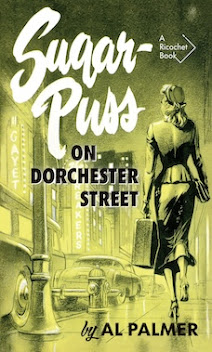Franklin W. Dixon [Leslie McFarlane]
New York: Grosset & Dunlop, [c. 1960]
214 pages
The fourth Hardy Boys book, I read The Missing Chums for the title alone. "Chums" is so dated a word that I'm not sure I've so much as typed it until just now. The novel features characters with names like "Biff" and "Slim," teenage boys who spend rainy days in a barn walking on their hands and practicing their boxing skills. They might take to the trapeze, as does Jerry Gilroy, performing something known as "skinning the cat":
As every boy knows, ‘‘skinning the cat" is an acrobatic feat that does not necessarily embrace cruelty to animals.This boy knew nothing about skinning the cat, and isn't sure what to make of the reassurance that it "does not necessarily embrace cruelty to animals [emphasis mine]."
Jerry's attempt at skinning the cat is interrupted by a swat on the butt administered by Chet Morton. Jerry returns the favour after using a sash window to restrain Chet:
Biff, Slim, Jerry, and Chet are but four of the Hardys' chums; Phil Cohen and Tony Prito, the latter owning a motorboat boat called the Napoli, round out their number. As every boy knows, Frank and Joe Hardy have a motorboat of their own, the Sleuth, which they purchased with reward money received in solving The Tower Treasure mystery. Biff Hooper doesn't have a motorboat himself, but his father does. Named the Envoy, it was purchased not long ago, which may explain the chum's ineptitude in piloting the craft.
 |
| Grossett & Dunlop, 1944 |
Biff and Chet receive a nice send-off from Frank, Joe, and the rest of the chums. Iola Morton and Callie Shaw are also present, but they're girls, not chums. As the Sleuth and Napoli escort the Envoy towards open water a thunderstorm rolls in. The Sleuth and Napoli return to port, while the Envoy motors on into the Atlantic Ocean.
Have I mentioned Biff's incompetence? It's a matter of comedy in the novel's earliest pages, but by the end of the first chapter he's on course to collide with two sailboats.
The second chapter begins with Frank grabbing the wheel, thus averting loss of life. "Thanks," Biff says, "I'd have never got out of that mess if you hadn't taken the wheel. I was so rattled that I didn't know what to do." Frank is magnanimous: "After you've run the boat a few more weeks you'll get so used to it that it'll be second nature to you."
A few more weeks do not pass.
There's some concern about Biff and Chet, which is elevated when a promised postcard fails to arrive. The Hardy boys would like to head out in the Sleuth to see what they can find, but what of mother?
 |
| Grossett & Dunlop, 1928 |
Ignoring the obvious – that The Missing Chums is set in a foreign country – the novel was written nearly one hundred years ago. Was this really a time in which an intelligent, able-bodied middle-aged woman could not take care of herself? Would parents of missing children really let days go by before alerting authorities? Children who were last seen heading out into the Atlantic? During a violent thunderstorm? In a motorboat piloted by a novice? Would those same parents have relied on their children's chums to find them, even if those chums were the Hardy boys?
Beginning in 1959, the thirty-eight earliest Hardy Boys titles underwent extensive revisions so as to bring them up to date. No more roadsters. Ethnic stereotypes were toned down.
I've found no evidence that Republican politicians were at all concerned.
Why not The Missing Friends? Was "chum" still so common in 1962?
I can't say. I pretty much missed the first eight months of that year.
Favourite sentence:
“I’ll say!’’ Iola replied, slangily.
Favourite exchange:
"Just a little while before they went on their trip I was talking to Chet and Biff and I remember that Biff said he had always wanted to visit Blacksnake Island.’’
"Blacksnake Island!’’ exclaimed Frank. “That’s the place that is overrun with big blacksnakes, isn’t it?"
Fun fact: The word "chum" appears in the text fifty-one times, roughly once every four pages. "Hardy boys" appears even more frequently – a total of eighty-eight times – which I'm supposing has everything to do with branding. And so, my second favourite exchange:
Trivia: In 1982, Armada, which owned the paperback rights to the Hardy Boys books in the UK, retitled the adventure The Mystery of the Missing Friends.
Object and Access: An unattractive, cheaply produced hardcover lacking dustjacket, I purchased my copy for one dollar twelve years ago in London, Ontario. The previous books in its "HARDY BOYS Mystery Stories" list suggests it was published in or about 1960. Its frontispiece is a bit of a spoiler.
As I write this, the most expensive copy of The Missing Chums listed online is going for US$950.
It is not a first edition.
There have been other translations – Swedish, Finnish, Italian, Spanish, and Japanese – but I'm fairly certain all are of the Buechler rewrite.
Gone Fishin' (without Frank and Joe Hardy)






























